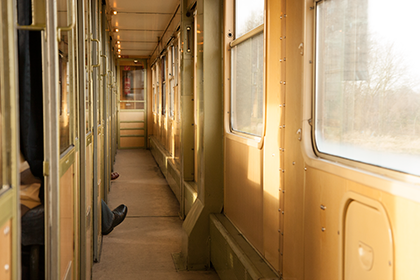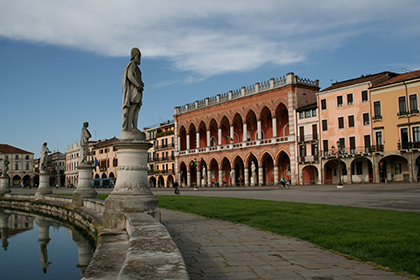During the winter of my senior year, I carefully scheduled my classes just so in order to have my college experience culminate in an awesome, once-in-a-lifetime, double summer study abroad program. It was going to be the best. I’d be doing a writing program in Florence, Italy, followed by a French-language intensive in Paris. Because I knew I’d want to do a lot of sightseeing on my days off, I purchased a Eurail pass in the States before I left. It wasn’t cheap, but I was told that it would save me a lot of money in the end instead of buying train tickets in Europe.
Cut to about six weeks later—I’m preparing to leave my program in Italy for Paris. I’d been using the Eurail pass around Italy over the past few weeks, taking day trips to cities like Venice and Siena. It seemed to be working just fine, so I figured I’d use it for my overnight train from Florence to Paris as well.
The day we were scheduled to leave, however, a friend of mine cautioned me that certain trains, specifically the overnight ones that went longer distances, wouldn’t accept the Eurail pass. I did a little research online and sure enough, he was right. This particular train wasn’t going to take my pass. I’d need to buy a ticket, and I’d need to do it quickly: every student in our program would be embarking on a mass exodus from the dorms at 5:00 that evening. We were being officially kicked out and would be unable to re-enter the Florence campus after 5:00, thanks to the way NYU had engineered everyone’s student visas and their wack-a-doo liability laws. It was a whole thing.
When I went online to buy my train ticket, it was unclear whether this train was being run by an Italian company or by a French company. The train I wanted to take showed up on both of the lines’ websites. I decided to roll the dice and purchased the ticket from the French website—I barely spoke any Italian, but I at least knew a little bit of French, so I figured I could (sort of) read the fine print. I bought the ticket, packed my bags, hugged all of my new friends goodbye, and hopped into a cab to the train station.
There had been a public transit strike in Italy while I was there (I later learned that there was a public transit strike in Italy at least once a month), so the train was delayed at least four hours. I waited. And waited. And waited. Stopped people watching when the people stopped doing anything worth watching and read my book. And waited some more. I couldn’t go back to the dorms, so I just had to sit there and hope that eventually I could get out of Florence
Finally, the train pulled up. I was exhausted and bored and starving for something resembling lunch… or dinner… or anything, honestly. I noticed that the passengers boarding in front of me were all holding tickets purchased from the Italian website. When I presented my French ticket, I was met by puzzled, mustachioed frowns and a lot of muttering in Italian.
The conductor, and some guy who I guess was his supervisor, examined my ticket. “We… do not know,” the conductor said in broken English and handed the ticket back to me. “No French ticket, we don’t speak it. I’m sorry.”
“Wait, so I can’t get on?” my jaw dropped. Where the hell was I supposed to go? “This is a ticket, for this train! I paid! See, here’s my receipt!”
I pointed furiously at the proof of purchase on the bottom of the ticket. More frowns. More Italian grumbles.
I stood there, weighing my options: I had to find a way onto this train. I was alone in a foreign country with nowhere to stay, and if I didn’t arrive in Paris the next morning, NYU would probably sound the alarm and call my parents in the States to tell them I’d disappeared into thin air. It’s worth mentioning here that I did not have a cell phone. My American phone didn’t work overseas, so I’d been relying on phone cards to call home in the dorms and I was out of minutes. It was after midnight, I had no idea where the nearest not-seedy hotel was, which meant wandering around the city alone in the middle of the night with my two enormous suitcases in tow. The only number I had for my destination was a New York phone number and it was a Sunday. I needed to get the hell on this train.
I heard people shouting something like “Andiamo!” from the back of the train, urging the conductor to get a move on. I was holding them up. The conductor’s supervisor (or whoever the heck he was) mumbled something in Italian that probably meant something like “I don’t have time for this, you deal with it.” Then, he walked away, leaving me alone with the conductor.
The conductor was this skinny guy with a bushy, unkempt mustache that looked like a caterpillar. I think his name was like… Giuseppe? Or Gironomo?
“We go on the train,” Gironoseppe finally said. “You stay with me here. We go to Paris. Yes?”
“Oh, thank you, thank you so much!” I practically threw my arms around Gironoseppe. Thank God.
He took me to his quarters, where he ordered me some food and some wine. I was like… okay. I’ll eat. But I needed to figure out where I was going to stay for the night. Like, I definitely wasn’t going to stay in the conductor’s sleeping chamber, right? Right. The guy was friendly enough, telling me about his wife and son who lived in Rome at his mama’s house, along with his two brothers and their wives and kids. He also kept telling me to drink more wine, which I politely refused. It had been a rough night, but not quite rough enough to get drunk in such close quarters with an utter stranger.
After we finished eating, Gironoseppe pulled an extra pillow and blanket from the closet and told me I should try to get some sleep. At that, I stood up, and concocted a story about a group from my NYU program who were also on the train and might have had an extra bunk in their sleeping compartment. This guy was probably well-intentioned and courteous and all of that but, like most girls, I’d been taught to trust my uh-oh feeling. So I picked up my two monstrous suitcases and peace’d. Sorry, Gironoseppe, I hope you understood. I mean, the Italians have to be at least vaguely familiar with the terms and conditions of Stranger Danger.
I made my way out into the hall, trying to find a spot where I could sleep/sit/while away the next eight hours ‘till we arrived in France. My ticket didn’t have a bunk assignment on it (which probably should have been an early warning sign that something was wrong with it. Oh well, too late now.) I wandered over to the dining car, and it was deserted. So I folded up my sweatshirt like a pillow and curled up on top of my suitcases. I’d just crash here. I’d make it work.
About an hour later, I was awoken by a kindly young British woman. I think I dreamed for half a second that Mary Poppins had come to rescue me (though maybe she just sounded Poppins-like and magical because I was so relieved to have an English-speaking female address me). She asked me why I was sleeping in the dark dining car all by myself. I explained the situation to her and she laughed, saying that there was plenty of space on the train. In fact, there was an empty bed in her compartment. I guess being a young female who spoke my native tongue was enough to win my trust. So, once again, I gathered my bags and I moved. This was becoming one of the longest nights of my life, and it was about to get longer.
I stayed in the bunk that Mary Poppins was sharing with her friend, and I managed to get a little bit of shut-eye. But just before dawn, our train lurched to a stop. And it stayed there, stopped where it was, somewhere on the border of France and Switzerland, for seven goddamn hours. I prayed that my French RAs weren’t the types to fly into a panic and tell my parents they ought to make plans to have my body shipped back to New York. I knew I had a lot of phone calls to make as soon as I got to Paris. Boy, oh boy.
Luckily, my NYU-in-Paris wardens weren’t the panicky types, and although I didn’t end up checking into my room until 9:00 that night and had to bathe in the dorm’s tiny, communal closet with an overhead faucet that passed for a shower, I’d never been more relieved. While everybody else was checking out the bar scene in the Latin Quarter and making new friends, I was upstairs, sleeping like a baby, resting on my stowaway laurels. I might have gotten a lively little anecdote out of the whole ordeal that I can kill with at social gatherings whenever studying abroad comes up. But, next time… I’m definitely taking a plane.

Photo by Andy Sutterfield
